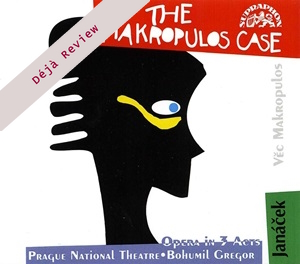
Déjà Review: this review was first published in June 2002 and the recording is still available.
Leoš Janáček (1854-1928)
The Makropulos Case – Opera in 3 Acts
Emilia Marty – Libuše Prylová, Albert Gregor – Ivo Žídek
Vitek – Rudolf Vonásek, Kristina – Helena Tattermuschová
Jaroslav Prus – Premsyl Kocí, Janek, his son – Viktor Kocí
Dr. Kolenatý – Karel Berman
Prague National Theatre Chorus and Orchestra / Bohumil Gregor
rec. 1965-66, Domovina Studio, Prague, Czechia
Supraphon 10 8351-2 612 AAD [2 CDs: 101]
Janáček composed The Makropulos Case between September 1923 and December 1925, and the work was finally premiered in December 1926. It is in fact the penultimate opera from the amazingly productive final decade of Janáček’s life. The composer himself described it as ‘a modern historical opera’, though any history in it only serves as a background for what is essentially a piece about the modern-day world. It particularly reflects the spirit and turmoil of the twenties.
The libretto (like all his mature operas) is by the composer himself, and is based on a play by Karel Čapek. The author was sceptical when Janáček first approached him for the rights; the legalistic paraphernalia at the centre of his play did not seem to lend itself to operatic treatment, and the modern-day setting of offices, theatres and hotel rooms hardly seemed conducive to a composer of Janáček’s folk-inspired tendencies. “That old crank”, joked Čapek “soon he’ll be setting the local column in the newspaper”. Janáček had, in fact, just done exactly that in The Cunning Little Vixen! However, when the playwright saw the premiere in Brno, he was obliged to admit – “He did it a hundred times better than I could ever have imagined”.
A brief glance over the plot does, at first, appear to justify Čapek’s original scepticism; the main thread revolves around a long-standing legal battle over an inheritance, a will and, needless to say, a lot of money. The character at the centre of all this wrangling is a beautiful, enigmatic opera singer who, it turns out, happens to be three hundred years old. Of course, Janáček’s sub-text is much more subtle, and at least one critic has seen this as the composer confronting his own old age and inevitable death. Another sees, in the cold-hearted heroine, Janáček expressing his ambivalent feeling towards Kamila Stosslová, the young woman he had fallen for, but whom he had come to realize would never reciprocate his affection.
Whatever the view, there is no doubt that the portrayal of Emilia Marty should dominate the proceedings, as it does in the famous Mackerras recording on Decca. Elizabeth Söderström’s warm, lyrical soprano invests the character with real sympathy, and is in total contrast to the assumption here by Libuse Prylová. The latter has a real edge to her voice, a piercing, steely quality that is disconcerting at first, but seems right for the part. She begins to ‘warble’ slightly (above the stave), but I would imagine she has been cast because of experience in performing the part on stage, and her vocal acting is totally convincing. It tends to be the smaller details that make the difference; sample her world-weary outburst in Act 3, where she spits out “God give me patience!” as she is interrogated about her age and identity – this is someone who really knows this part. The soaring lyricism of this final act is in stark contrast to the rather spiky dissonance of the first two, and Prylová revels in it, even though the voice lacks the sheer beauty of Söderström.
All the other parts are cast using ‘authentic’ Czech singers, and very good they are too. The naturalistic speech patterns, so unique to this composer, pose no problems to this ensemble. The orchestra have the music in their bones, and the pacing is swift and tight. I like Gregor’s handling of the typically quirky prelude, with its odd fanfares, bustling rhythms and angular melodies giving us a glimpse of modern city life. The recording quality is a lot better than I seem to remember from 60s Supraphon sources, with very good balance and focus.
This could be given a real thumbs up, were it not for Mackerras’s well-nigh definitive Decca version. His two-disc set finds plenty of room for a worthwhile fill-up, the splendid early Lachian Dances, and the authoritative notes by leading expert John Tyrrell make the Supraphon booklet (spattered with timing mistakes and typos) look poor by comparison.
At budget or mid-price, this can be confidently recommended. It has an unmistakably authentic feel about it, with acerbic Czech brass playing, the difficult language easily rolling off the tongue, and the conductor and cast obviously totally inside the piece. It deserves success.
Tony Haywood
Buying this recording via a link below generates revenue for MWI and helps us keep free access to the site

Also available at: Supraphon


















